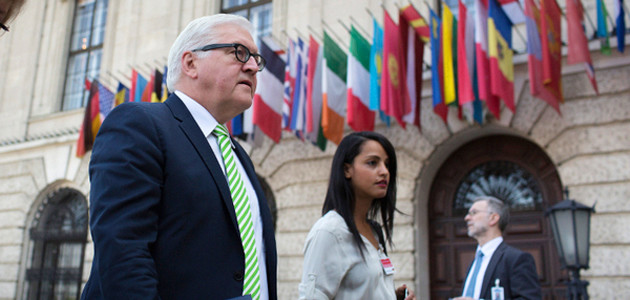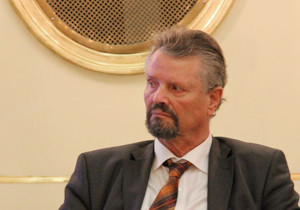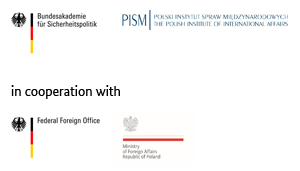In prospect of the German Chairmanship of the OSCE in 2016 the Federal Academy and the Polish Institute of International Affairs organised a conference in Warsaw on 4 November.

German Foreign Minister Frank-Walter Steinmeier visiting OSCE headquarters in Vienna, July 2015. Picture: Federal Foreign Office/Photothek/Imo
High ranking politicians and experts from over 15 member states of the Organization for Security and Co-operation in Europe (OSCE) came together to commemorate the 25th anniversary of the Charter of Paris. The high-level conference was co-organised by the German "Federal Academy for Security Policy" and the "Polish Institute of International Affairs" supported by Germany’s Federal Foreign Office and Poland’s Ministry of Foreign Affairs.

Gernot Erler, Special Representative for Germany's OSCE chairmanship, during the high-level meeting in Poland's capital. Picture: PISM/Aleksandra Żebrowska
With 57 signatories the OSCE is the only security focused organization that includes all European and post-Soviet states, as well as the United States, Canada and Mongolia. The Charter of Paris of 1990 documented the end of the Cold War and the East-West divide in Europe. Furthermore, it introduced standards of human rights and security relations – yet, 25 years later Europe faces a deep security crisis challenging its future security architecture. Especially the Russian annexation of Crimea and its support of the separatists in Eastern Ukraine manifest new divisions and a lack of fulfilment of the principles of 1990.
In Warsaw, panel participants discussed the significance of the Charter of Paris back in 1990 as well as today, the role that the OSCE can play with its approach of comprehensive security, which contribution the conventional arms control architecture can provide for the improvement of East-West politico-military relations and to what extent the human dimension will guide the future of the organization. Everyone agreed that the principles of 1990 – which created a broad understanding of security that includes the politico-military dimension, the economic and environmental dimension and the human dimension – are a non-negotiable and still existing commitment for all OSCE member states.
Continued commitment to democracy, peace and unity
The conference recognized the need to engage in open dialogue and re-establish consensus without compromising the commitments made in 1990, as these remain central to European security. Thus, Gernot Erler affirmed that Germany’s chairmanship goals will be to "renew dialogue, rebuild trust and restore security" in accordance with the principles of the Charter of Paris. Erler has been appointed as Special Representative for the German OSCE chairmanship in 2016 by the Federal Government.

Organizers: the Federal Academy for Security Policy and the Polish Institute for International Affairs, in cooperation with the German Federal Foreign Office and the Polish Ministry of Foreign Affairs. Illustration: Federal Academy for Security Policy
The crisis in Ukraine is only the most recent example in which the OSCE has proven its ability to rapidly scale up its operations. Moreover, it has demonstrated its relevance as an organization that can achieve de-escalation through crisis management and promoting dialogue and cooperation by engaging all stakeholders. Conference participants agreed that in order for an organization such as the OSCE to be effective it must provide security to all of its member states rather than promoting policies of isolation.
During the panel discussions the necessity to rebuild cooperation and trust stood in the foreground as a requirement to revive the OSCE. "Looking back at the crises that this organization has survived," participants were however optimistic in this regard stating that, "this mission is possible."
Author: Leonie Munk
